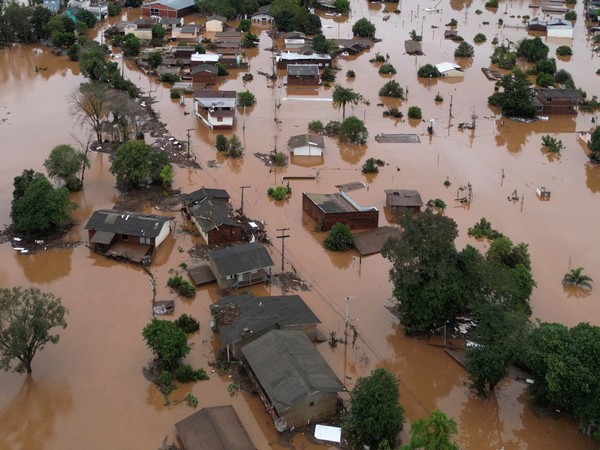Brasilia [Brazil], May 5: Massive flooding and landslides triggered by days of heavy rain in Brazil's southernmost state have killed nearly 60 people.
Officials say another 67 people are missing in Rio Grande do Sul. Nearly 25,000 residents have been forced to leave their homes since the storms began last Saturday. At least half a million were without power and clean water, with further rainfall expected.
The extreme weather has been caused by a rare combination of hotter than average temperatures, high humidity and strong winds.
More than half of the 497 cities in the state have been affected by the storms, with roads and bridges destroyed in several areas. The storms also caused landslides and the collapse of a hydroelectric dam near the city of Bento Gonçalves, killing 30 people. A second dam in the area was also at risk of collapsing due to rising water levels, authorities said.
In Porto Alegre, the regional capital, the Guaiba river broke its banks, flooding streets and submerging some neighbourhoods. Porto Alegre's international airport has suspended all flights for an "undetermined" period.
One resident said the damage was "heart breaking".
"I live in this area, so I feel sorry for everyone who lives here. It's very sad, and it's regrettable that all this is happening," Maria Luiza told the BBC.
In Porto Alegre, the capital of the state, the Guaíba, a lake formed by the confluence of several rivers, reached a record level of 4.77 metres on Friday evening, according to the city's civil defence authorities. This exceeded the previous record set in 1941 by one centimetre.
Brazilian President Luiz Inacio Lula da Silva has visited the region, promising help from the central government.
da Silva described the disaster as one of the worst floods in the country's history.
"Never in the history of Brazil has there been so much rain in one place," he said at a press conference with Japanese Prime Minister Fumio Kishida in the capital Brasilia.
Meteorologists have predicted further rains to fall in the region as a cold front moves across it. Officials said that more than 2,000 civilian rescue workers were deployed, and the Defence Ministry said more than 900 soldiers were also dispatched alongside nine military aircraft and 98 boats to help with the rescue effort.
So far, more than 8,000 people have been rescued.
The rain began on Monday and caused widespread flooding and landslides in some areas. Houses and bridges were damaged and numerous roads were made impassable.
Last year, more than 30 people were killed in a cyclone in Rio Grande do Sul. Brazil's National Institute of Meteorology attributed the increased intensity and frequency of rainfall to the climate phenomenon El Niño.
Source: Qatar Tribune

